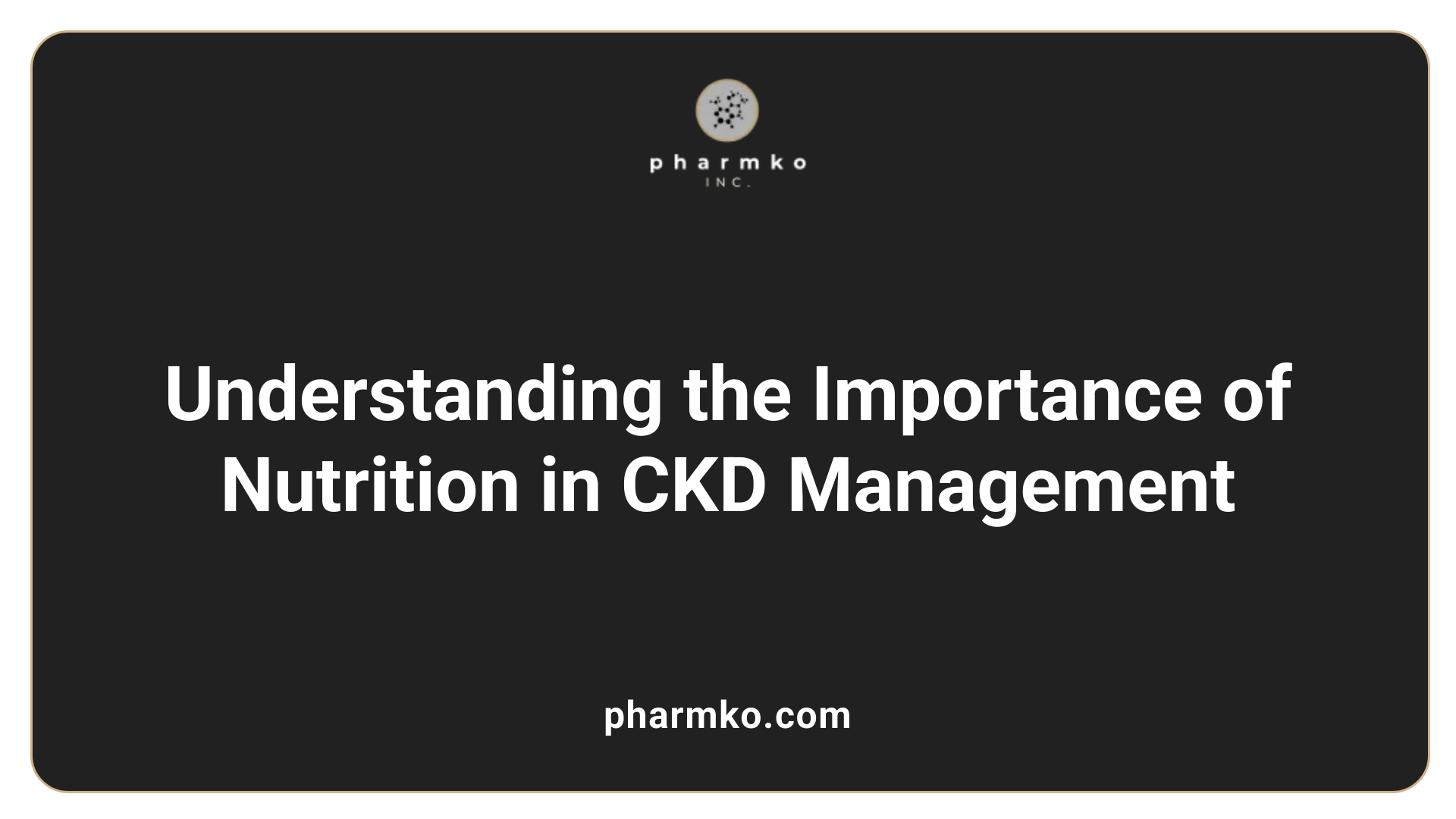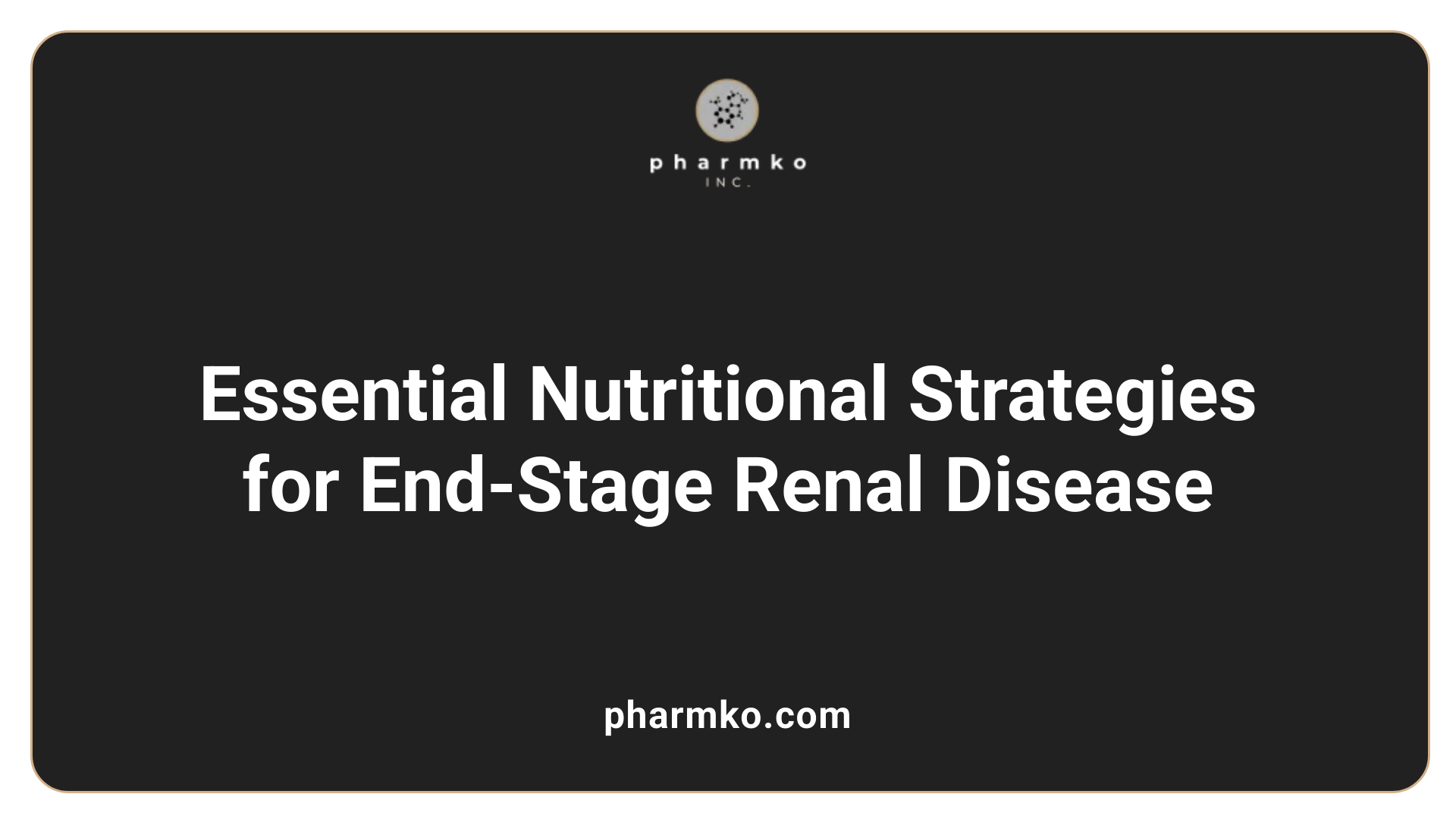Renal disease nutrition treatments
Understanding the Importance of Nutrition in Renal Disease
Renal disease, encompassing conditions such as chronic kidney disease (CKD) and end-stage renal disease (ESRD), imposes significant dietary challenges for patients. Proper nutritional management is pivotal in slowing disease progression, alleviating symptoms, and improving overall health outcomes. This article explores the intricate role of nutrition in renal disease management, covering essential dietary adjustments and treatments specific to different stages of kidney disease.
The Role of Nutrition in CKD Management

What role does nutrition play in managing chronic kidney disease (CKD)?
Nutrition plays a critical role in managing chronic kidney disease (CKD) by aiding in the control of uremic symptoms and slowing the progression of kidney dysfunction. Proper dietary choices can significantly impact the overall wellbeing of patients by minimizing the workload on the kidneys. This is especially important since kidneys in CKD patients have a reduced ability to filter waste products effectively.
Key dietary adjustments may include:
- Limiting Protein Intake : Reducing protein, particularly from animal sources, decreases the amount of waste that kidneys must filter. This helps prevent further damage and manages symptoms effectively.
- Controlling Sodium : Reducing sodium intake is vital to manage blood pressure and fluid retention. Patients are often advised to keep their sodium intake below 2.3 g per day, avoiding high-salt foods and processed snacks.
- Monitoring Potassium and Phosphorus : CKD impairs the body’s ability to excrete potassium and phosphorus, which can lead to dangerous imbalances. Therefore, a careful selection of foods low in these minerals is essential.
Details on dietary changes for CKD
Dietary recommendations for CKD may also include:
- Fresh Fruits and Vegetables : These are typically lower in potassium and phosphorus, making them safer choices compared to processed foods.
- Whole Grains : Opting for whole grains can help meet calorie needs without significantly increasing protein or phosphorus intake.
- Consultation with a Dietitian : Collaboration with a registered dietitian specializing in kidney health is highly recommended. They can provide personalized meal plans tailored to individual nutritional needs, ensuring patients maintain a balanced diet while managing their condition effectively.
This comprehensive approach to nutrition can help CKD patients better manage their health and improve their quality of life.
Dietary Changes for Managing Renal Disease

How do dietary changes impact the management of renal disease?
Dietary changes can greatly impact the management of renal disease, particularly chronic kidney disease (CKD). These changes are crucial in slowing disease progression and minimizing complications. A renal diet typically includes:
- Limiting Sodium : Reducing sodium intake helps manage blood pressure and fluid retention.
- Controlling Potassium : High potassium levels can be dangerous; thus, foods like bananas and potatoes should be limited.
- Restricting Phosphorus : Avoiding foods high in phosphorus, such as dairy and red meats, reduces the risk of bone disorders.
- Reducing Protein : Lower protein intake minimizes the waste that kidneys must filter, thus lessening their workload.
Specific dietary approaches have shown promise in improving kidney health. These include the Mediterranean diet, which focuses on whole foods rich in fruits and vegetables, and the whole foods plant-based diet, both of which may help delay CKD progression.
Medical nutrition therapy (MNT) plays a critical role in CKD management, enhancing patient outcomes and effectively managing comorbidities. Close monitoring of nutrient intake can prevent complications like metabolic acidosis. Additionally, a registered dietitian can assist in tailoring dietary plans that cater to individual health needs, ensuring a balanced intake that supports renal health while avoiding foods that may exacerbate the condition.
Adopting these dietary practices reinforces the vital role nutrition plays in managing renal disease, contributing to overall well-being and kidney function maintenance.
Nutritional Treatments for End-Stage Renal Disease

Are there specific nutritional treatments recommended for end-stage renal disease?
Yes, there are tailored nutritional strategies for individuals with end-stage renal disease (ESRD), especially those on dialysis. For patients undergoing dialysis, protein intake requires careful consideration. Typically, the recommendation is to increase protein intake to about 1.2 grams per kilogram of body weight . This emphasis on high-quality protein sources, such as fish, poultry, and eggs, is vital since dialysis can remove proteins from the body.
In addition to protein, potassium , phosphorus , and sodium needs must be closely monitored. Limiting high-potassium foods—such as bananas and spinach—as well as foods rich in phosphorus—like dairy products and beans—helps in managing potential complications. Sodium intake should also be restricted to less than 2300 mg per day to support blood pressure control.
Moreover, fluid intake is particularly nuanced. Patients are advised to limit it to approximately 700-1000 mL/day , tailored according to their urine output, to prevent fluid overload, which can lead to complications such as swelling and difficulty breathing.
What role do dietitians play in ESRD management?
Dietitians specializing in kidney disease play a crucial role in managing the nutritional needs of patients with ESRD. Their expertise is invaluable in designing a personalized meal plan , taking into account individual health conditions, blood test results, and dietary restrictions. They guide patients in making appropriate food choices while ensuring the diet provides adequate nutrition.
Additionally, dietitians assist patients in understanding nutrient monitoring, which is essential for effectively managing their condition. They may also recommend micronutrient supplementation to address deficiencies commonly seen among dialysis patients, ensuring a balanced intake of vitamins and minerals. This inclusive approach not only helps in managing ESRD but also enhances overall well-being, allowing patients to navigate their dietary needs with confidence.
| Nutritional Aspect | Recommendations | Important Notes |
|---|---|---|
| Protein Intake | 1.2 g/kg body weight | Focus on high-quality sources. |
| Potassium Limitation | Limit high-potassium foods | Examples: Bananas, potatoes. |
| Phosphorus Limitation | Avoid phosphorus-rich foods | Examples: Dairy, beans. |
| Sodium Limitation | Less than 2300 mg/day | Helps manage blood pressure. |
| Fluid Intake | 700-1000 mL/day based on urine output | Prevents fluid overload. |
| Role of Dietitians | Create personalized meal plans | Ensure nutrient monitoring and supplementation. |
Effective Dietary Approaches to Preserve Kidney Health

What are effective dietary approaches for managing kidney health and preventing kidney failure?
Effective dietary approaches for managing kidney health and preventing kidney failure involve several key strategies. One primary recommendation is following the DASH diet , which emphasizes:
- Fruits and Vegetables : Rich in essential nutrients and low in sodium.
- Whole Grains : Provide necessary fiber and promote healthy digestion.
- Low-Fat Dairy : A source of calcium without excessive phosphorus.
- Limited Sodium and Red Meat : To control blood pressure and reduce waste excess for the kidneys.
Maintaining a lower protein intake is crucial, as protein consumption generates waste that needs filtration by the kidneys. Focusing on plant-based protein sources over animal proteins helps reduce this workload.
Another essential area is monitoring potassium and phosphorus levels in the diet:
- Lower Potassium Foods : Limit foods such as bananas and potatoes, while opting for lower potassium options like apples and cabbage.
- Phosphorus Restrictions : Avoid high-phosphate foods such as dairy, red meats, and nuts; instead, choose fresh fruits and vegetables.
Maintaining hydration is also advisable, balanced with fluid restrictions as needed, particularly for those on dialysis. Integrating heart-healthy foods , like fish and nuts, can improve overall cardiovascular health, directly benefiting kidney function.
It's often beneficial to consult a registered dietitian who specializes in kidney health. They can help develop a personalized meal plan that aligns with individual health needs and dietary restrictions, enabling better management of chronic kidney disease.
Navigating Nutritional Adjustments in Conjunction with Medication
How does medication affect nutritional needs or dietary recommendations in renal disease management?
Medications can significantly impact nutritional requirements and dietary guidelines for those managing renal diseases. Often, prescribed drugs alter how nutrients are metabolized in the body, influence appetite, and change energy levels.
For instance, in chronic kidney disease (CKD), the interaction between specific medicines and dietary elements is crucial. Certain medications may necessitate careful adjustments in potassium, phosphorus, and sodium intake to mitigate any potential complications. A successful therapeutic strategy frequently involves collaborative care between nephrologists and renal dietitians, aimed at personalizing pharmacological and nutritional interventions to optimize patient outcomes.
This collaboration is vital because the choice of protein sources and the overall caloric intake must be tailored to support kidney function. For example, if a patient is prescribed ACE inhibitors to control blood pressure, the dietitian may recommend further limiting sodium to enhance the medication's effectiveness. Likewise, if a patient is taking phosphate binders, they must adhere to a diet low in phosphorus, ensuring a comprehensive approach to dietary management alongside their medication regime.
Regular monitoring of kidney performance, along with the effects of various medications on nutrient levels, is essential for maintaining quality of life. This combined focus on diet and medication assists in enhancing the effectiveness of treatments, potentially slowing disease progression and improving overall health.
Key Considerations
- Potassium Management: Certain heart medications may require more potassium control.
- Phosphorus Control: Phosphate binders necessitate a low phosphorus diet.
- Sodium Intake: Blood pressure medications work best with low sodium intake.
Nutritional Adjustments Related to Medications
| Medication Type | Nutritional Adjustment Needed | Example Nutrient Affected |
|---|---|---|
| ACE Inhibitors | Reduce sodium intake | Sodium |
| Phosphate Binders | Limit phosphorus intake | Phosphorus |
| Diuretics | Monitor fluid and potassium levels | Potassium |
| Statins | Manage dietary fats and cholesterol intake | Saturated fat |
In summary, managing nutritional needs alongside medication in renal disease treatment requires a vigilant and patient-centered approach. This way, patients can achieve better outcomes while enhancing their dietary health.
Comprehensive Overview of Dietary Management Options
Can you give a comprehensive overview of dietary management options for renal disease?
Dietary management for chronic kidney disease (CKD) is crucial, as it helps control the intake of significant nutrients like sodium, potassium, phosphorus, and protein. Tailoring these dietary aspects to each patient's specific condition and stage of treatment is essential.
Sodium Control
A low-sodium diet is critical for managing blood pressure. CKD patients are advised to limit sodium intake to less than 2,300 mg per day . This can be achieved by avoiding processed foods and reducing added salt during cooking.
Protein Intake
Protein intake must be monitored closely. For patients in stages 3-5 of CKD , a lower protein diet is recommended to minimize kidney workload. Typically, this means consuming less than 0.8 grams of protein per kilogram of body weight . However, for individuals undergoing dialysis , the recommendation shifts to increasing protein consumption, often to about 8 to 10 ounces of high-protein foods daily to compensate for protein loss during treatment.
Focus on Nutrient-Rich Foods
In addition to sodium and protein adjustments, phosphorus and potassium levels must also be managed:
- Phosphorus : Foods high in phosphorus, such as dairy and beans, should be limited to avoid complications. Favor fresh fruits, vegetables, and whole grains.
- Potassium : Avoid high-potassium foods, including bananas and potatoes, and opt for lower potassium alternatives like apples and cabbage.
Importance of a Kidney-Friendly Diet
Adopting heart-healthy dietary patterns can significantly impact kidney function and overall health. Diets such as the DASH (Dietary Approaches to Stop Hypertension) or the Mediterranean diet are beneficial, highlighting:
- Fruits and vegetables
- Whole grains
- Low-fat dairy
Importance of Professional Guidance
Regular consultations with a registered dietitian specializing in kidney nutrition are vital. They assist in developing personalized dietary plans and ensure adherence to necessary food restrictions tailored to the patient's unique health needs. This collaborative approach enhances the effectiveness of dietary management and helps improve patients' quality of life.
The Importance of Protein Management in Renal Diets
Protein Intake in Renal Disease
Managing protein intake is crucial for individuals with chronic kidney disease (CKD). A lower protein diet helps minimize the waste products that protein generates as it is processed by the body. This waste can accumulate in the blood when the kidneys are not functioning properly, leading to further health complications. Registered dietitians can provide tailored advice to help patients reduce protein consumption while ensuring they still receive essential nutrients from other food groups.
Balancing Protein for Kidney Health
For patients on dialysis, the approach to protein changes. In these cases, dietary adjustments may require higher protein intake since the dialysis process removes some protein from the body. However, for those at earlier stages of CKD, limiting high-protein foods, like meats and dairy, supports kidney function. It remains essential for all CKD patients to consult a dietitian to develop an eating plan that aligns with their specific needs and stages of the disease, striking the right balance between minimizing waste and maintaining overall health.
Sodium, Potassium, and Phosphorus: Key Nutrients to Monitor
Nutrient Restrictions in Kidney Disease
In managing chronic kidney disease (CKD), particular attention must be paid to certain nutrients, including sodium, potassium, and phosphorus. Reducing sodium intake is paramount; this means avoiding processed foods and limiting the use of table salt. The goal is to consume less than 2,300 mg of sodium daily, which is crucial for maintaining healthy blood pressure levels and minimizing kidney strain.
Apart from sodium, potassium needs to be monitored closely. Foods that are high in potassium, such as bananas, oranges, and potatoes, may worsen kidney function and should be limited. Instead, patients are encouraged to choose lower potassium options like apples, cabbage, and green beans.
Guidelines for Mineral Intake
Phosphorus is another nutrient that requires restriction in kidney disease management. High-phosphate foods, including dairy products, red meat, and beans, can lead to elevated phosphorus levels in the blood, potentially contributing to bone disease. Patients should focus on fresh fruits and vegetables, whole grains, and limit high-phosphorus options.
| Nutrient | Recommended Daily Intake | Foods to Limit |
|---|---|---|
| Sodium | < 2,300 mg | Processed foods, table salt |
| Potassium | Varies; often < 3,000 mg | Bananas, potatoes, spinach |
| Phosphorus | Varied, often < 800 mg | Dairy, red meat, beans |
These dietary guidelines are essential for maintaining kidney health and preventing complications associated with CKD.
Lifestyle Modifications Beyond Diet in Renal Disease

Exercise and kidney health
Increasing physical activity plays a significant role in managing chronic kidney disease (CKD). Engaging in regular exercise helps maintain a healthy weight, improve blood pressure control, and enhance overall well-being. The recommended approach is to combine aerobic activities—such as walking, cycling, or swimming—with resistance training to strengthen muscles. Aim for at least 150 minutes of moderate exercise weekly, although it’s essential for individuals to consult their healthcare provider before starting any new exercise program.
Holistic approaches to CKD
Alongside diet and exercise, adopting a holistic approach can benefit kidney health. Techniques such as stress management, mindfulness, and adequate sleep can help regulate blood pressure and support overall health. Quitting smoking is also strongly advised as smoking can worsen kidney function and increase cardiovascular risks. Moreover, limiting alcohol consumption can be beneficial to kidney health. Incorporating these lifestyle modifications not only fosters kidney health but also promotes a well-rounded approach to managing chronic kidney disease.
The Role of Dialysis and Post-Transplant Nutrition
Dietary Needs During Dialysis
Dialysis is a vital treatment for individuals with kidney failure, performing functions similar to healthy kidneys by filtering waste and excess fluid from the blood. However, during dialysis, dietary needs shift significantly. Patients on dialysis must often increase their protein intake, as some protein is lost through the process. This might include consumption of high-quality protein sources such as lean meats and eggs.
Additionally, strict monitoring of sodium and potassium intake is essential. Patients should avoid high-sodium foods to manage blood pressure and reduce fluid retention. Foods high in potassium, such as bananas and oranges, may also need to be limited to prevent complications.
| Nutrient | Recommended Intake | Reason for Limitation |
|---|---|---|
| Protein | Increased focus on quality | Lost during dialysis |
| Sodium | < 2300 mg/day | To control blood pressure and fluid balance |
| Potassium | Limited (varies per patient) | To avoid hyperkalemia (high potassium levels) |
Post-Transplant Dietary Adjustments
Following a kidney transplant, patients often experience a different set of dietary guidelines compared to those on dialysis. Although many restrictions are lifted, the importance of a balanced diet remains crucial. Fruits, vegetables, and whole grains are strongly encouraged to facilitate recovery and support overall health.
Moreover, monitoring sodium, potassium, and phosphorus intake is still beneficial, as transplant patients can be at risk for cardiovascular issues and imbalances due to medications post-surgery. Regular consultations with a dietitian are recommended to tailor a dietary plan that considers each patient’s unique needs and health status.
Through careful planning, individuals can transition towards a more sustainable diet that promotes kidney health and overall well-being after a transplant.
Emphasizing Personalized Nutrition in Renal Disease
Managing renal disease requires a comprehensive approach where dietary interventions play a central role. Personalized meal planning, guided by healthcare professionals, is vital in controlling symptoms, slowing disease progression, and improving quality of life. For those impacted by renal disease, understanding and adapting to their dietary requirements can make a significant difference in their health journey. Emphasizing the importance of working with registered dietitians and maintaining regular health check-ups ensures that nutritional treatments are effective and sustainable over the long term.
References
- Chronic kidney disease - Diagnosis and treatment
- Chronic Kidney Disease (CKD): Symptoms & Treatment
- Chronic kidney disease - Treatment
- End-stage renal disease - Diagnosis and treatment
- Medicines to manage kidney disease
- Kidney failure (ESRD) - Symptoms, stages, & treatment
- Dialysis: Types, How It Works, Procedure & Side Effects
- End Stage Renal Disease (ESRD)
- Chronic kidney disease (CKD) - Symptoms, causes ...













